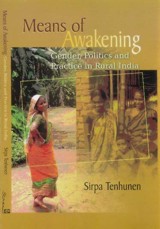Patriarchy
 This book deals with the nature, origin, hermeneutics and
sociology of patriarchy. Reviewing the sources available, it discusses the
historical contexts which have nurtured patriarchal societies. Finally it
applies these ideas to Indian history and sociology and examines how caste has
interacted synergistically with patriarchy in India. A useful text for students
as well as for the general reader.
This book deals with the nature, origin, hermeneutics and
sociology of patriarchy. Reviewing the sources available, it discusses the
historical contexts which have nurtured patriarchal societies. Finally it
applies these ideas to Indian history and sociology and examines how caste has
interacted synergistically with patriarchy in India. A useful text for students
as well as for the general reader.
‘Today, the term 'patriarchy' is used somewhat differently. It is not only a descriptive term that explains how specific societies construct male authority and power, but also an analytical category. The transformation of patriarchy from a descriptive to an analytical category happened in a specific global historical context, the 1970s, that gave birth to a rousing feminist intellectual culture.’
V.Geetha is an independent scholar who writes in both Tamil and in English.Among her books are Gender (this series) and with S.V.Rajadurai, Towards a Non-Brahmin Millenium:From Iyothee Thass to Periyar (Samya 1998).She is editorial director, Tara Publishing, Chennai.Maithreyi Krishnaraj is a pioneering scholar in gender studies and was formerly professor and director, Research Centre for Women's Studies, SNDT Women's University, Mumbai.
V.
Geetha
Series Editor Maithreyi Krishnaraj
demy octavo pb ISBN 81 85604 46 0 Feb 2007 rpt 2009 Rs 250
 This book deals with the nature, origin, hermeneutics and
sociology of patriarchy. Reviewing the sources available, it discusses the
historical contexts which have nurtured patriarchal societies. Finally it
applies these ideas to Indian history and sociology and examines how caste has
interacted synergistically with patriarchy in India. A useful text for students
as well as for the general reader.
This book deals with the nature, origin, hermeneutics and
sociology of patriarchy. Reviewing the sources available, it discusses the
historical contexts which have nurtured patriarchal societies. Finally it
applies these ideas to Indian history and sociology and examines how caste has
interacted synergistically with patriarchy in India. A useful text for students
as well as for the general reader.‘Today, the term 'patriarchy' is used somewhat differently. It is not only a descriptive term that explains how specific societies construct male authority and power, but also an analytical category. The transformation of patriarchy from a descriptive to an analytical category happened in a specific global historical context, the 1970s, that gave birth to a rousing feminist intellectual culture.’
V.Geetha is an independent scholar who writes in both Tamil and in English.Among her books are Gender (this series) and with S.V.Rajadurai, Towards a Non-Brahmin Millenium:From Iyothee Thass to Periyar (Samya 1998).She is editorial director, Tara Publishing, Chennai.Maithreyi Krishnaraj is a pioneering scholar in gender studies and was formerly professor and director, Research Centre for Women's Studies, SNDT Women's University, Mumbai.
Published By:Stree
Enquiries: 16
Southern Ave, Calcutta 700026 tel:033 2466 0812/ 033 6519 5737
email streesamya.manager@gmail.com website: www.stree-samyabooks.com



















